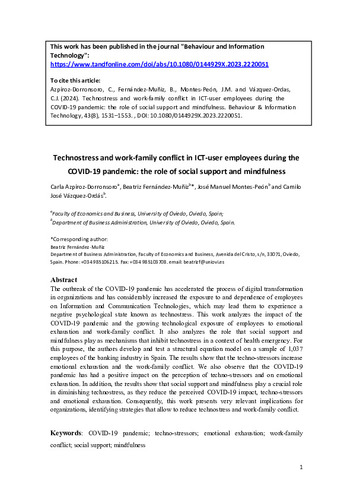Technostress and work-family conflict in ICT-user employees during the COVID-19 pandemic: the role of social support and mindfulness
Autor(es) y otros:
Fecha de publicación:
Versión del editor:
Citación:
Descripción física:
Resumen:
The outbreak of the COVID-19 pandemic has accelerated the process of digital transformation in organisations and has considerably increased the exposure to and dependence of employees on Information and Communication Technologies, which may lead them to experience a negative psychological state known as technostress. This work analyses the impact of the COVID-19 pandemic and the growing technological exposure of employees to emotional exhaustion and work-family conflict. It also analyses the role that social support and mindfulness play as mechanisms that inhibit technostress in a context of health emergency. For this purpose, the authors develop and test a structural equation model on a sample of 1037 employees of the banking industry in Spain. The results show that the techno-stressors increase emotional exhaustion and the work-family conflict. We also observe that the COVID-19 pandemic has had a positive impact on the perception of techno-stressors and on emotional exhaustion. In addition, the results show that social support and mindfulness play a crucial role in diminishing technostress, as they reduce the perceived COVID-19 impact, techno-stressors and emotional exhaustion. Consequently, this work presents very relevant implications for organisations, identifying strategies that allow to reduce technostress and work-family conflict
The outbreak of the COVID-19 pandemic has accelerated the process of digital transformation in organisations and has considerably increased the exposure to and dependence of employees on Information and Communication Technologies, which may lead them to experience a negative psychological state known as technostress. This work analyses the impact of the COVID-19 pandemic and the growing technological exposure of employees to emotional exhaustion and work-family conflict. It also analyses the role that social support and mindfulness play as mechanisms that inhibit technostress in a context of health emergency. For this purpose, the authors develop and test a structural equation model on a sample of 1037 employees of the banking industry in Spain. The results show that the techno-stressors increase emotional exhaustion and the work-family conflict. We also observe that the COVID-19 pandemic has had a positive impact on the perception of techno-stressors and on emotional exhaustion. In addition, the results show that social support and mindfulness play a crucial role in diminishing technostress, as they reduce the perceived COVID-19 impact, techno-stressors and emotional exhaustion. Consequently, this work presents very relevant implications for organisations, identifying strategies that allow to reduce technostress and work-family conflict
ISSN:
Colecciones
- Administración de Empresas [514]
- Artículos [37549]
Ficheros en el ítem





